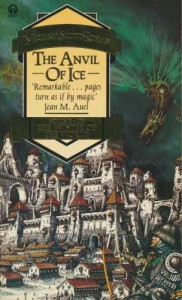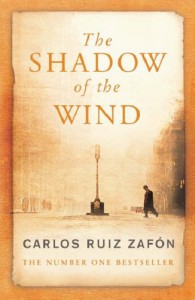Review: ‘Wayward Girls and Wicked Women’ ed. Angela Carter
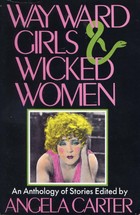 This collection of stories, about bad girls and wicked women, extols the female virtues of discontent, sexual disruptiveness and bad manners. The authors featured include Ama Ata Aidoo, Djuna Barnes, Jane Bowles, Colette, Bessie Head, Katherine Mansfield and Jamaica Kincaid. (Goodreads Summary)
This collection of stories, about bad girls and wicked women, extols the female virtues of discontent, sexual disruptiveness and bad manners. The authors featured include Ama Ata Aidoo, Djuna Barnes, Jane Bowles, Colette, Bessie Head, Katherine Mansfield and Jamaica Kincaid. (Goodreads Summary)
Although I really enjoy Angela Carter’s own short stories, evidently I’m not as keen on her choice of those of other writers. Perhaps it was the collection of so many female-centred stories in one book, but I did feel that I was being beaten over the head with conspicious feminism a lot of the time, as strings of women were driven to the titular ‘wickedness’ through the opressive situations in which they found themselves rather than any real fault of their own. The tone of the book seems to ask “but what else could they have done?” which, while it’s an interesting perspective to read from, did get a little wearing.
That complaint aside, there were some stories that I really enjoyed. The folk tale style of the story of Lena and Una, complete with typical folk justice, was particularly good and the haunting story of the Okes of Okehampton reminded me of Daphne du Maurier. All in all, an interesting collection, but not one I think I’m likely to read again.
Wayward Girls and Wicked Women ed. Angela Carter. Published by Virago, 2004, pp. 339. Originally published in 1986.
N.B. This is an old review written in 2010 and posted on Goodreads and LibraryThing before I started keeping track of all the books I read here at Old English Rose Reads. I’ve decided to keep copies here so that this remains a complete record of my reading since I started reviewing books for my own pleasure.
Review: ‘The Forge in the Forest’ by Michael Scott Rohan
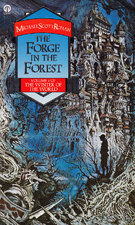 The siege of Kerbryhaine had been raised, the Ekwesh hordes vanquished, the Mastersmith slain. But for Alv — now Elof the Smith — the war was not yet won: Kerbryhaine was still a divided city; the Ekwesh, bloodily defeated, would look for revenge; and the Ice, implacably malevolent, continued its inexorable march southward.
The siege of Kerbryhaine had been raised, the Ekwesh hordes vanquished, the Mastersmith slain. But for Alv — now Elof the Smith — the war was not yet won: Kerbryhaine was still a divided city; the Ekwesh, bloodily defeated, would look for revenge; and the Ice, implacably malevolent, continued its inexorable march southward.
So from divided Kerbryhaine Elof, Kermorvan and his companions mounted an expedition to the legendary lost cities of the East; if they managed to reunite the war-torn tribes, perhaps they could stand together against the menae of the Ice. But to Elof and Kermorvan the journey would also bring knowledge: of the Powers ranged for and against them; and of the secrets within themselves waiting to be revealed — secrets that would play a part in the war yet to come. (Goodreads Summary)
I was pleasantly surprised by how much I enjoyed this book. As the title suggests, smithcraft is central to the book, and Rohan has a knack of taking complicated forging and metalworking processes and describing them in a way which makes them interesting, understandable and easy to visualise. Unfortunately, this is sometimes to the detriment of other areas of plot, which sometimes feel cursory and inexplicable. The gradual removal of the other travelling companions, for example, often came across as rather abrupt and contrived. That said, this was a lovely rambling epic of a book and I look forward to reading the next installment.
The Forge in the Forest: The Winter of the World II by Michael Scott Rohan. Published by Time Warner, 1990, pp. 406. Originally published in 1987.
N.B. This is an old review written in 2010 and posted on Goodreads and LibraryThing before I started keeping track of all the books I read here at Old English Rose Reads. I’ve decided to keep copies here so that this remains a complete record of my reading since I started reviewing books for my own pleasure.
Review: ‘Dark Magic’ by Christine Feehan
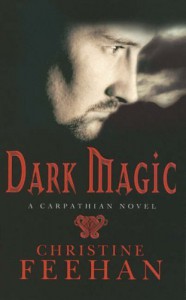 Young Savannah Dubrinski is a mistress of illusion. A world-famous magician capable of mesmerizing millions. But there was one–Gregori, the Dark One–who held her in terrifying thrall. Whose cold silver eyes and heated sensuality sent shivers of danger, of desire, down her slender spine. With a dark magic all his own, Gregori-the implacable hunter, the legendary healer, the most powerful of Carpathian males-whispered in Savannah’s mind that he was her destiny. That she had been born to save his immortal soul. An now, here in New Orleans, the hour had finally come to claim her. To make her completely his in a ritual as old as time…and as escapable as eternity. (Goodreads Summary)
Young Savannah Dubrinski is a mistress of illusion. A world-famous magician capable of mesmerizing millions. But there was one–Gregori, the Dark One–who held her in terrifying thrall. Whose cold silver eyes and heated sensuality sent shivers of danger, of desire, down her slender spine. With a dark magic all his own, Gregori-the implacable hunter, the legendary healer, the most powerful of Carpathian males-whispered in Savannah’s mind that he was her destiny. That she had been born to save his immortal soul. An now, here in New Orleans, the hour had finally come to claim her. To make her completely his in a ritual as old as time…and as escapable as eternity. (Goodreads Summary)
I picked up the first six books in this series second hand on the recommendation of a friend, but I certainly won’t be wasting my time reading any more beyond this point. I found the first couple of books interesting as they presented a different take on the basic vampire story, but now at book 4 it seems it’s just a case of substituting the appropriate names and locations and everything else is just the same. And it’s not just a matter of the story being repetitious; there are whole phrases which are repeated throughout the books, which seems like laziness rather than a deliberate device. I appreciate that part of the appeal of these books must lie in the fact that they are, essentially, all the same, but they very definitely aren’t for me.
Dark Magic: Carpathians IV by Christine Feehan. Published by Piatkus, 2007, pp. 349. Originally published in 2000.
N.B. This is an old review written in 2010 and posted on Goodreads and LibraryThing before I started keeping track of all the books I read here at Old English Rose Reads. I’ve decided to keep copies here so that this remains a complete record of my reading since I started reviewing books for my own pleasure.
Review: ‘Farewell, My Queen’ by Chantal Thomas
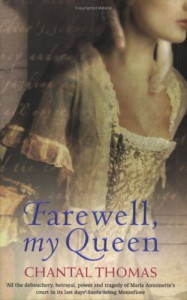 On 14 July 1789, Queen Marie Antoinette and her court spend a pleasant evening in the Great Hall of Versailles, completely unaware that the events of the next few hours will change their lives and their country for ever. Agathe-Sidonie Laborde is the Queen’s reader, and twenty-one years later, an exile in Vienna, she remains haunted by the chaos and fear of those final days at court. Hour by hour, Agathe watchs the tragedy unfold as everything she holds dear is overturned. In the midst of this chaos, the Queen remains an enigma, adored and reviled in equal measure by those to whom she must now turn for help. (Goodreads Summary)
On 14 July 1789, Queen Marie Antoinette and her court spend a pleasant evening in the Great Hall of Versailles, completely unaware that the events of the next few hours will change their lives and their country for ever. Agathe-Sidonie Laborde is the Queen’s reader, and twenty-one years later, an exile in Vienna, she remains haunted by the chaos and fear of those final days at court. Hour by hour, Agathe watchs the tragedy unfold as everything she holds dear is overturned. In the midst of this chaos, the Queen remains an enigma, adored and reviled in equal measure by those to whom she must now turn for help. (Goodreads Summary)
I have my doubts as to whether whoever wrote the review quoted on the cover calling this book “a racy, pacy story with a cast of rogues and villains” has in fact read it. It was neither racy, nor pacy, and the characters weren’t fleshed out enough to be rogues and villains. In fact, it didn’t really have characters at all, just figures who appeared as the narrative required. However, while I wasn’t the slightest bit interested in the characters, least of all the insipid narrator, I was quite intrigued by the events she described. Chantal Thomas does an excellent job of portraying the downfall of Versailles, she just doesn’t make you care about it.
Farwell, My Queen by Chantal Thomas. Published by Phoenix, 2004, pp. 256. Originally published in 2002.
N.B. This is an old review written in 2010 and posted on Goodreads and LibraryThing before I started keeping track of all the books I read here at Old English Rose Reads. I’ve decided to keep copies here so that this remains a complete record of my reading since I started reviewing books for my own pleasure.
Review: ‘The Anvil of Ice’ by Michael Scott Rohan
First in a trilogy that blends magic with prehistory, here is a tale of potent magicks, immortal struggles, and human courage in the face of evil forces and awesome odds that follows Elof and his band of adventurers in a battle with the evil Mastersmith Mylio. (Goodreads Summary)
I picked up this trilogy second hand on a whim and I’m very glad I did. The first book has the stately feel of a Germanic epic, but the characters are interesting and well created. It borrows from the tradition without slavishly copying it, which made for a more interesting book in my opinion. I did find the occasional metatextual interjections stating that the story was taken from an ancient text to be slightly irritating as they interrupted the flow of the narrative, but otherwise I thoroughly enjoyed this book.
The Anvil of Ice: The Winter of the World Book I by Michael Scott Rohan. Published by Time Warner, 1990, pp. 352. Originally published in 1986.
N.B. This is an old review written in 2010 and posted on Goodreads and LibraryThing before I started keeping track of all the books I read here at Old English Rose Reads. I’ve decided to keep copies here so that this remains a complete record of my reading since I started reviewing books for my own pleasure.
Review: ‘The Shadow of the Wind’ by Carlos Ruiz Zafon
Barcelona, 1945-just after the war, a great world city lies in shadow, nursing its wounds, and a boy named Daniel awakes on his eleventh birthday to find that he can no longer remember his mother’s face. To console his only child, Daniel’s widowed father, an antiquarian book dealer, initiates him into the secret of the Cemetery of Forgotten Books, a library tended by Barcelona’s guild of rare-book dealers as a repository for books forgotten by the world, waiting for someone who will care about them again. Daniel’s father coaxes him to choose a volume from the spiraling labyrinth of shelves, one that, it is said, will have a special meaning for him. And Daniel so loves the novel he selects, The Shadow of the Wind by one Julian Carax, that he sets out to find the rest of Carax’s work. To his shock, he discovers that someone has been systematically destroying every copy of every book this author has written. In fact, he may have the last one in existence. Before Daniel knows it his seemingly innocent quest has opened a door into one of Barcelona’s darkest secrets, an epic story of murder, magic, madness and doomed love. And before long he realizes that if he doesn’t find out the truth about Julian Carax, he and those closest to him will suffer horribly. (Goodreads Summary)
I read a great many books, but it’s rare that I find one that I enjoy quite as much as I did this one. It intrigued and fascinated me to the point where, although I guessed the end relatively early on, I was still devouring the book at a rate of knots in order to find out how exactly the author would get there. I look forward to reading more from this author.
The Shadow of the Wind by Carlos Ruiz Zafon. Published by Phoenix, 2005, pp. 510. Originally published in Spanish in 2003.
N.B. This is an old review written in 2010 and posted on Goodreads and LibraryThing before I started keeping track of all the books I read here at Old English Rose Reads. I’ve decided to keep copies here so that this remains a complete record of my reading since I started reviewing books for my own pleasure.
To begin at the beginning
Just like most people who decide to start book blogs, I have always loved to read. I read at an unstoppable pace when I was little, continued right the way through primary school, secondary school and sixth form college before coming to a near complete stop when I started my English degree. Suddenly, I was reading so many novels and plays and poems to study that I no longer had time to read for pleasure. The same was true when I moved on to study medieval literature, although I did read a little more than before, purely for the relief of reading something in modern English.
Recently, the acquisition of a real, proper, full time job has provided me with four hours every day on the train travelling between where I live and the delightful place that is central London, where I work. Although most people think I am insane not to move closer to work, those four hours provide me with an ideal opportunity for reading again. What better way to distract oneself from being slowly crushed by the snoring man encroaching on ones seat – and indeed lap — or from being squashed up against the armpit of a fragrant commuter on the tube than to to escape into a book?
This blog will be a document of the books I read: what I think of them, where and why I bought them, and what will be their fate once they have been read. It will also follow my attempts to reduce my towering To Be Read Stack to a manageable amount as, since signing myself up to LibraryThing and finally cataloguing at least all of my non-academic books, I have discovered that I have 460 unread books. At my current rate of reading (about 15 books a month) that’s enough to keep me going for around two and a half years, so I expect I’ll be here for some time.
